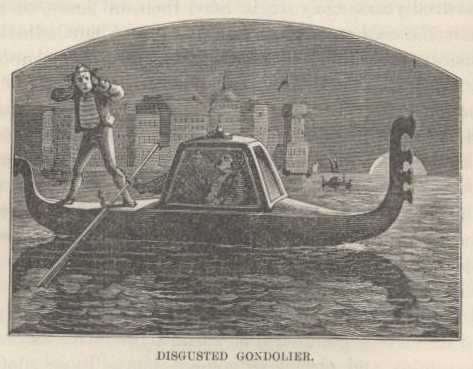First Impressions
This Venice, which was a haughty, invincible, magnificent Republic for nearly fourteen hundred years; whose armies compelled the world’s applause whenever and wherever they battled; whose navies well nigh held dominion of the seas, and whose merchant fleets whitened the remotest oceans with their sails and loaded these piers with the products of every clime, is fallen a prey to poverty, neglect and melancholy decay. Six hundred years ago, Venice was the Autocrat of Commerce; her mart was the great commercial centre, the distributing-house from whence the enormous trade of the Orient was spread abroad over the Western world. To-day her piers are deserted, her warehouses are empty, her merchant fleets are vanished, her armies and her navies are but memories. Her glory is departed, and with her crumbling grandeur of wharves and palaces about her she sits among her stagnant lagoons, forlorn and beggared, forgotten of the world. She that in her palmy days commanded the commerce of a hemisphere and made the weal or woe of nations with a beck of her puissant finger, is become the humblest among the peoples of the earth,--a peddler of glass beads for women, and trifling toys and trinkets for school-girls and children.

The venerable Mother of the Republics is scarce a fit subject for flippant speech or the idle gossipping of tourists. It seems a sort of sacrilege to disturb the glamour of old romance that pictures her to us softly from afar off as through a tinted mist, and curtains her ruin and her desolation from our view. One ought, indeed, to turn away from her rags, her poverty and her humiliation, and think of her only as she was when she sunk the fleets of Charlemagne; when she humbled Frederick Barbarossa or waved her victorious banners above the battlements of Constantinople.
Night and Day
What a funny old city this Queen of the Adriatic is! Narrow streets, vast, gloomy marble palaces, black with the corroding damps of centuries, and all partly submerged; no dry land visible any where, and no sidewalks worth mentioning; if you want to go to church, to the theatre, or to the restaurant, you must call a gondola. It must be a paradise for cripples, for verily a man has no use for legs here.
For a day or two the place looked so like an overflowed Arkansas town, because of its currentless waters laving the very doorsteps of all the houses, and the cluster of boats made fast under the windows, or skimming in and out of the alleys and by-ways, that I could not get rid of the impression that there was nothing the matter here but a spring freshet, and that the river would fall in a few weeks and leave a dirty high-water mark on the houses, and the streets full of mud and rubbish.
In the glare of day, there is little poetry about Venice, but under the charitable moon her stained palaces are white again, their battered sculptures are hidden in shadows, and the old city seems crowned once more with the grandeur that was hers five hundred years ago. It is easy, then, in fancy, to people these silent canals with plumed gallants and fair ladies--with Shylocks in gaberdine and sandals, venturing loans upon the rich argosies of Venetian commerce--with Othellos and Desdemonas, with Iagos and Roderigos--with noble fleets and victorious legions returning from the wars. In the treacherous sunlight we see Venice decayed, forlorn, poverty-stricken, and commerceless--forgotten and utterly insignificant. But in the moonlight, her fourteen centuries of greatness fling their glories about her, and once more is she the princeliest among the nations of the earth.